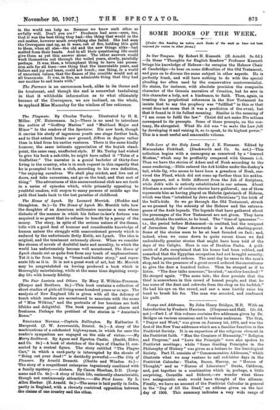Folk-Lore of the Holy Land. By J. E. Hanauer. Edited
by Marmaduke Pickthall. (Duckworth and Co. 8s. not.)—This collection begins with a cosmogony as conceived by a " learned Moslem," which may be profitably compared with Genesis i.-ii. Then we have the stories of Adam and of Noah according to the same rendering,—Eblis entered the Ark hidden under the donkey's tail, while Og, who seems to have been a grandson of Noah, sur- vived the Flood, which did not come up further than his ankles. Job appears, not a little different from the Job of Scripture, white Job's wife is entirely rehabilitated in our esteem. About Abraham a number of curious stories have gathered; one of them represents him as having played on Habran (patriarch of Hebron, which was then "inhabited by Jews and Christians") the trick of the bull's-hide. So we go through the Old Testament, struck as we proceed by the sobriety of the Hebrew and the extrava- gance of the Arab legends. Tho legends that have gathered about the personages of the Now Testament are not given. They have ceased, thinks the author, to be local. The " time of ignorance "- i.e., the period before Mohammed—is omitted, but the conquest of Jerusalem by Omar downwards is a fresh starting-point. Some of the stories seem to be at least founded on fact; and, indeed, when we come down to quite recent times we find undoubtedly genuine stories that might have been told of the days of the Caliphs. Here is one of Ibrahim Pasha. A gold- smith of Jaffa complained that his house had been robbed, and remarked that the Egyptian occupation had not brought security. The Pasha promised redress. The next day he came to the man's shop, and in the presence of a great crowd ordered the executioner to give the door a hundred lashes. Then he stooped as if to listen. " The door talks nonsense," he cried; " another hundred ! " Ho stooped again. "The same tale; the door persists that the thief is somewhere in this crowd of honest people, and that he has some of the dust and cobwebs from the shop on his tarbitsh." He had his eye on the crowd, and saw a man hastily raise his hand to brush his fez. The man was arrested, and confessed his guilt.


















































 Previous page
Previous page